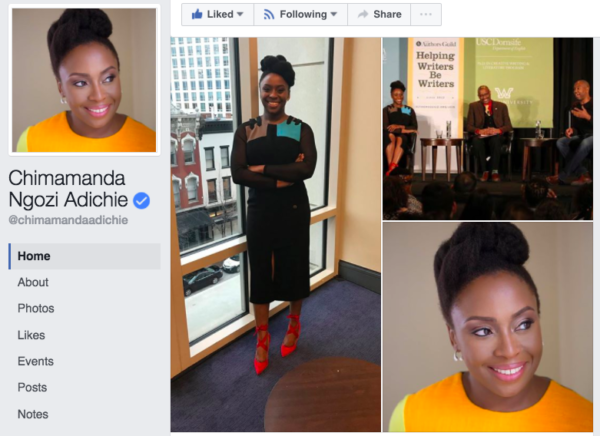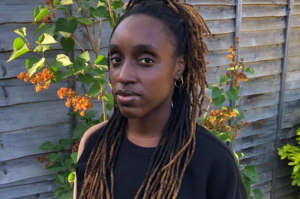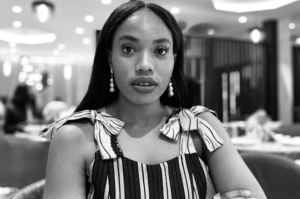For those who haven’t noticed, Chimamanda Adichie now posts things by herself on Facebook. Her fan page, with 811,313 likes at the moment of writing, has always been manned by her publishers.
At John Hopkins University recently, she described social media’s tendency to allow a “casual crossing of personal boundaries” between strangers, something she is wary of. Still, towards the end of last year, and more prominently this year, she has been making some posts by herself.
Here are six things to expect now that she is personally on Facebook.
1. Direct communication.
It’s one thing to see a favourite thinker’s talks and TV interviews and to read her in the news, but it’s a wholly different thing reading her on social media. On Facebook, most of our top writers fall into three categories. The first are those who run their accounts themselves—Taiye Selasi, Aminatta Forna, Petina Gappah, Chika Unigwe, Zukiswa Wanner—who seem to have decided against converting them into fan pages, preferring to post personal things while sharing links about their professional lives and even engaging other people directly. The second are those who communicate through fan pages which may or may not be run by their teams—Teju Cole, NoViolet Bulawayo—but who also post personal notes so that their Timelines are characterized by a link to an interview or award nomination here and a post on the day’s social issue there. Often, the existence of a fan page is the difference between the first and second groups, and most times, the writers have both personal accounts and fan pages— Binyavanga Wainaina, Rotimi Babatunde. The final group has their fan pages strictly run by their teams—Achebe, Chigozie Obioma—with no aspects of their lives beyond news reportage and commentary. From this final group, Adichie seems to have shifted into the second group. An important marker was her publication of “Dear Ijeawele” as a Facebook post. It will now be more exciting to say, “Adichie posted on Facebook,” rather than the customary “Adichie said in a talk.”
2. Snippets of her personal life.
It is telling that the first time Adichie opened up about a private matter—one she was not using to illustrate a point in an essay or a talk—was the Olisa.tv interview in 2015, and only to tell her part of the story in a controversy. Her private life is a door that opens once a decade and briefly so. Even though her pregnancy had been public knowledge since her baby bump was spotted at Farafina, she only talked about it after delivery. It is tough to run a Facebook account personally and not share something personal. Recently, in a post appraising the person and art works of Njideka Akunyili-Crosby, Adichie dwells briefly on how the late Dora Akunyili pushed a rosary into her palms. Most recently, she shared photos of the two women to whom she has dedicated Dear Ijeawele: Uju Egonu, her “Bestfriend for life. Safekeeper of my emotions. Sharer of all my life’s major moments. The one I call to cry and to laugh. My style consultant. My life consultant. Partner in foolishness”; and Ogechukwu Ikemelu, her “Technically-my-first-cousin-but-really-my-baby-sister. My confidant. My completely-trusted ‘Second.’ My beloved side-kick.” We might be seeing more of such touching moments.
3. An even firmer control of her public image.
Adichie is a conversation-starter: she speaks and people discuss. In Nigeria, her comments on national issues are dissected and analyzed and taken out of context and defended and criticized and embraced. Her views have become so important that the actress Tika Sumpter, who is set to portray Michelle Obama in a forthcoming biopic, was asked last year what she thought about Adichie writing in Americanah that Michelle’s wig contributed to the public embrace of her husband. Because being a superstar comes with super, unavoidable controversies, writing on Facebook will allow Adichie to contextualize her future comments as she did with the “Her Feminism Is Not My Feminism” Beyonce controversy, and most recently, the “Trans Women Are Trans Women” interview. Not to mention giving us insider details like she did with the BBC Newsnight drama with the Trump Supporter.
4. Posts signed off with her initials: CNA.
Frankly, Adichie’s signing off of personal notes on Facebook with her initials, CNA, does read as Chimamanda Has Spoken, and what a personal touch it gives those notes. It seemed to make her brief tribute to Buchi Emecheta even more beautiful. Expect more CNA-signed posts.
5. Stunning photos of her fashionable herself.
One of the public duties (!) of a fashion icon like Adichie is to share photos of her fashionista self, which she did most recently. Or of her socially-conscious self, which she also did with the Women’s March photos. Expect to see more photos of her usual selves—in interviews and talks, in functions—but one thing to not expect is a photo of her baby.
6. An excerpt from her next book.
Hope, but don’t expect, that Adichie might share an excerpt from her next novel. It was reported in the flyer for her recent conversation with Between the World and Me author Ta-Nehisi Coates that they would be reading from new works. We do not know whether she eventually did read from hers but its prospect is truly exciting. The gaps between her fiction books have been roughly consistent: three years between Purple Hibiscus (2003) and Half of a Yellow Sun (2006), and another three years until The Thing around Your Neck (2009), and then four years until Americanah (2013). 2017 is the fourth year since. But what if it isn’t even a novel? Or even a collection of stories? What if it’s a book of creative non-fiction? Or one of essays? Or poetry? Whichever it is, we hope she shares it, and we have this strong hunch that one day she would.
**************
First photo from Quartz via Google.
Facebook link image by Stephen Voss for the Guardian










Chimamanda Ngozi Adichie Is Now on Twitter – The Okenyodo January 17, 2019 11:38
[…] Ngozi Adichie, who began personally using her Facebook page in 2016 and who joined Instagram in 2017, is now on Twitter. The move was made by the author to forestall […]